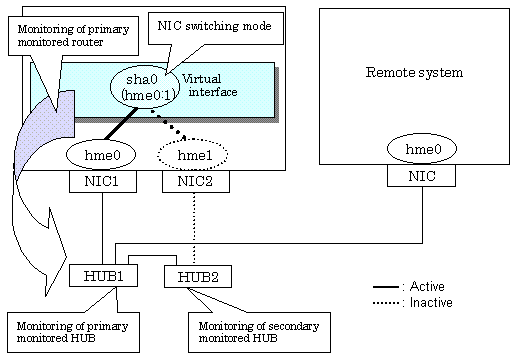

| PRIMECLUSTER Global Link Services Configuration and Administration Guide: Redundant Line Control Function 4.1 (for Solaris(TM) Operating System) |
Contents
Index
 
|
| Chapter 2 Feature description | > 2.2 Option Functions | > 2.2.7 Router/HUB monitoring function |
The HUB monitoring function issues the ping command to adjacent HUB at regular intervals and switches the interface to be used when a line failure is detected. Up to two HUBs can be registered per virtual interface. This function is available exclusively for NIC switching mode.

HUB monitoring function over NIC switching mode supports both configuration of the monitoring target for each virtual interface and start/stop of router monitoring.
This function can also monitor a transfer path between two HUBs (this is called HUB-to-HUB monitoring function). HUB-to-HUB monitoring function, detects a failure between two HUBs. This function can thus prevent a communication error from occurring due to NIC switching when a HUB-to-HUB failure occurs.

If the standby patrol function is used, the HUB-to-HUB monitoring is not required because the standby patrol function is comprised with HUB-to-HUB monitoring function. (See Section "2.2.9 Standby patrol function")
Figure 2.31 shows an outline of the HUB monitoring function


If a hub cannot have an IP address, IP address of a host or a router that is connected to the hub can be monitored. However, if the monitored host or router stops, polling the host or router fails and a NIC switching event might occur. In order to prevent an unnecessary switching process, it is recommended to set up two monitoring targets, as well as enabling HUB-to-HUB monitoring function in case one of the monitoring targets stops.

 2.2.7.2.1 Not using HUB-to-HUB monitoring feature
2.2.7.2.1 Not using HUB-to-HUB monitoring feature 2.2.7.2.2 Using HUB-to-HUB monitoring feature
2.2.7.2.2 Using HUB-to-HUB monitoring feature 2.2.7.2.3 Transfer path monitoring on individual virtual interface
2.2.7.2.3 Transfer path monitoring on individual virtual interface
Contents
Index
 
|